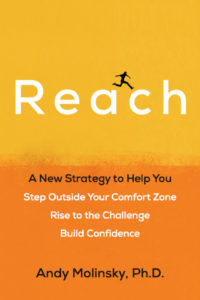Donald Trump is the President of the United States. And it’s sent shockwaves through tens of millions of Americans, who never thought they’d hear those words. Feelings are raw; despair and distrust are at an all time high. And many of us feel helpless about what to do next. And that’s exactly why I scrapped my university lesson today on cultural adaptation – or at least part of it – to do a check in — to see how my students were doing; and see whether the students of today might offer a ray of hope to the rest of us struggling to see a bright future in what feels like a dark new reality. And they didn’t disappoint.
The context was a course I teach at Brandeis University on acting outside your comfort zone – which happens to be quite relevant to this week’s events. Learning to step outside your comfort zone might not change the reality of a Trump presidency, but could it provide us with a roadmap for the healing process and moving forward?
The answer, at least from today’s session, was a resounding yes. The students quickly detailed an impressive list of things that this election result has already inspired them to do. For many, the results of the election, while frightening, also provided a strong and compelling reason to take a leap in their lives: to take steps to move forward and craft a future they could be proud of and buy into, despite the impediments now in their way.
For example, a number of my more reticent students talked about speaking up – and speaking out – about how uncomfortable they always have been to speak their voice, but how in an instant that has changed. And it now felt essential: “How can I ensure that my voice is heard in this new administration of a president whose views I don’t agree with or believe in?,” one student wondered. “ I know I need to take a more active role – to protest (though I’ve never protested – it sounds risky and I may get hurt or arrested), to write letters to my representatives in DC (though I find it’s hard to write and who knows if they will read it?). I can’t be passive, but it’s also outside my comfort zone to speak up and take a stand.
Others talked about the critical importance of perspective taking – even if, on the face of it, you abhor the other side and can’t fathom how they could possibly support someone for whom you have such disdain. “Americans need to step outside their “bubbles,” one student argued. “We have to stop categorizing all Trump supporters as racist and sexist and under-educated and try to understand the logic behind their decisions.” And it’s also essential to look at the big picture, one student remarked, “it’s easy to root for Trump to fail, but if he fails, we all fail as well.”
Many of us aren’t quite there yet. The anger is too hot. The uncertainty is too great to even consider a way forward. But that wasn’t the case with the students I spoke with – who, for sure, felt strong emotions, but who also expressed a sense of maturity, courage, and grit I found inspiring. And after that session today, I have more faith in our young people than ever before to take the lead in healing our nation.
 AVAILABLE JANUARY 2017
AVAILABLE JANUARY 2017
Reach A New Strategy to Help You Step Outside Your Comfort Zone
According to Andy Molinsky, an expert on behavior in the business world, there are five key challenges underlying our avoidance tendencies: authenticity, competence, resentment, likability and morality. Does the new behavior you’re attempting feel authentic to you? Is it the right thing to do? Answering these questions will help identify the “gap” in our behavioral style that we can then bridge by using the three Cs: Clarity, Conviction, and Customization. Perhaps most interesting, Molinsky has discovered that many people who confront what they were avoiding come to realize that they actually enjoy it, and can even be good at it.